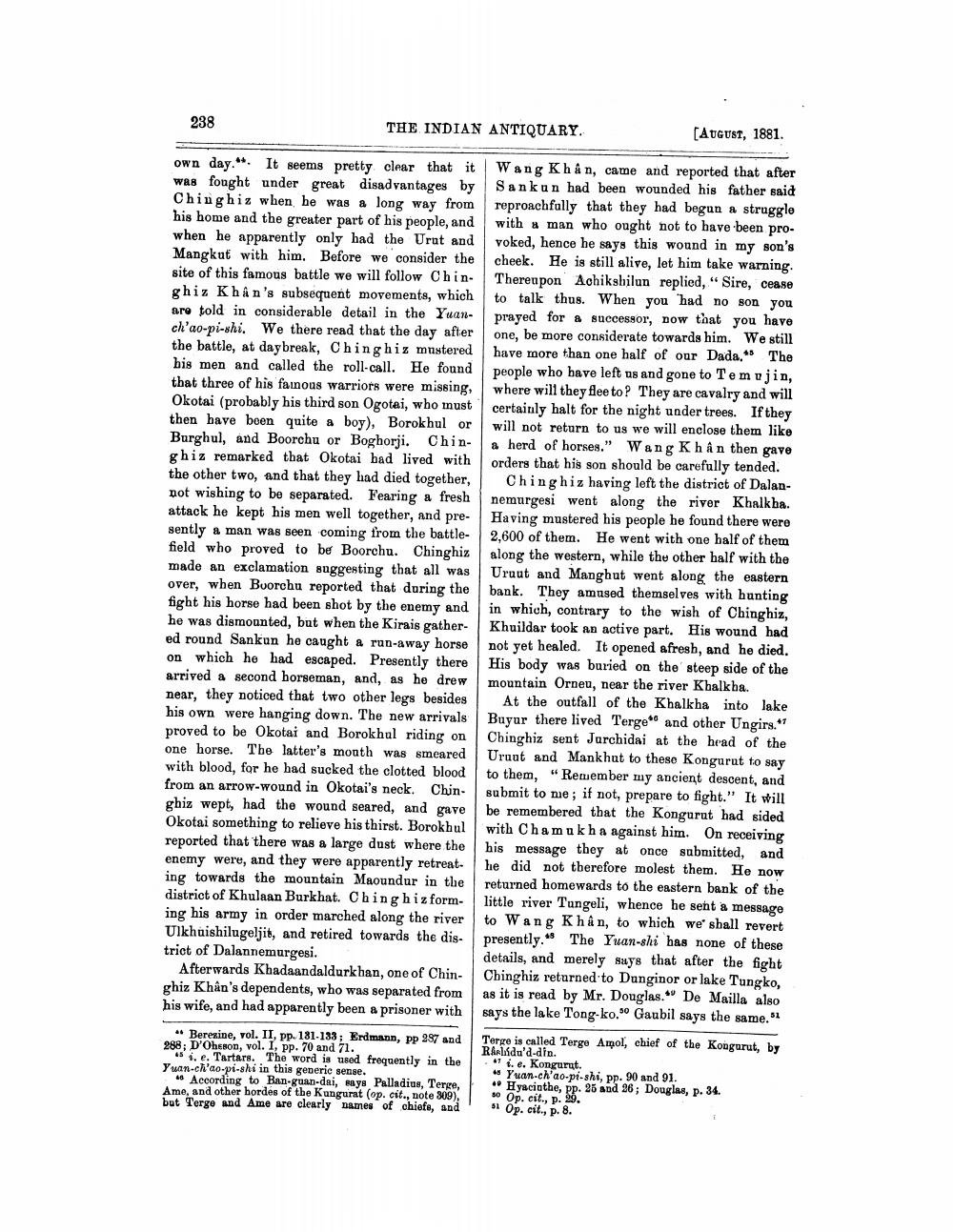________________
238
THE INDIAN ANTIQUARY.
[AUGUST, 1881.
own day.". It seems pretty clear that it Wang Khán, came and reported that after was fought under great disadvantages by Sankun had been wounded his father said Chinghiz when he was a long way from reproachfally that they had begun a struggle his home and the greater part of his people, and with a man who ought not to have been prowhen he apparently only had the Urat and voked, hence he says this wound in my son's Mangkut with him. Before we consider the cheek. He is still alive, let him take warning: site of this famous battle we will follow Chin. Thereupon Achikshilun replied, "Sire, cease ghiz Khan's subsequent movements, which to talk thus. When you had no son you are told in considerable detail in the Yuan- prayed for a successor, now that you have ch'ao-pi-shi. We there read that the day after one, be more considerate towards him. We still the battle, at daybreak, Chinghiz mastered have more than one half of our Dada. The bis men and called the roll-call. He found people who have left us and gone to Temujin, that three of his fainous warriors were missing, where will they flee to? They are cavalry and will Okotai (probably his third son Ogotai, who must certainly halt for the night under trees. If they then have been quite a boy), Borokhul or will not return to us we will enclose them like Burghul, and Boorchu or Boghorji. China herd of horses." Wang Khân then gave ghiz remarked that Okotai bad lived with orders that his son should be carefully tended. the other two, and that they had died together, Chinghiz having left the district of Dalannot wishing to be separated. Fearing a fresh nemurgesi went along the river Khalkha. attack he kept his men well together, and pre- Having mustered his people he found there were sently a man was seen coming from the battle- 2,600 of them. He went with one half of them field who proved to be Boorchu. Chinghiz along the western, while the other half with the made an exclamation suggesting that all was Uruut and Manghut went along the eastern over, when Boorchu reported that during the bank. They amused themselves with hunting fight his horse had been shot by the enemy and in which, contrary to the wish of Chinghiz, he was dismounted, but when the Kirais gather- Khuildar took an active part. His wound had ed round Sankun he caught a run-away horse not yet healed. It opened afresh, and he died. on which he had escaped. Presently there His body was buried on the steep side of the arrived a second horseman, and, as he drew mountain Orneu, near the river Khalkba. near, they noticed that two other legs besides At the outfall of the Khalkha into lake his own were hanging down. The new arrivals Buyur there lived Terge and other Ungirs." proved to be Okotai and Borokhul riding on Chinghiz sent Jarchidai at the head of the one horse. The latter's month was smeared Uruut and Mankhat to these Kongurut to say with blood, for he had sucked the clotted blood to them, “Remember my ancient descent, and from an arrow-wound in Okotai's neck. Chin. submit to me; it not, prepare to fight." It will ghiz wept, had the wound seared, and gave be remembered that the Kongurut had sided Okotai something to relieve his thirst. Borokhul with Chamukha against him. On receiving reported that there was a large dust where the his message they at once submitted, and enemy were, and they were apparently retreat he did not therefore molest them. He now ing towards the mountain Maoundur in the returned homewards to the eastern bank of the district of Khulaan Burkhat. Chinghiz form- little river Tangeli, whence he sent a message ing his army in order marched along the river to Wang Khân, to which we shall revert Ulkhuishilugeljit, and retired towards the dis- presently." The Yuan-shi has none of these trict of Dalannemurgesi.
details, and merely says that after the fight Afterwards Khadaandaldurkhan, one of Chin- Chinghiz returned to Dunginor or lake Tungko, ghiz Khân's dependents, who was separated from as it is read by Mr. Douglas." De Mailla also his wife, and had apparently been a prisoner with says the lake Tong-ko." Gaubil says the same."
- Berezine, vol. II, pp. 181-183; Erdmann, pp 287 and Terge is called Terge Amol, chief of the Kongurut, by 288; D'Ohsson, vol. I, pp. 70 and 71.
RArlidu'd-din. 1. e. Tartars. The word is used frequently in the "1. e. Kongurut. Yuan-ch'ao-pi-shi in this generic sense.
* Yuan-ch'ao-pi-shi, pp. 90 and 91. According to Ban-guan-dai, says Palladius, Terge, · Hyacinthe, pp. 25 and 26; Douglas, p. 34. Ame, and other hordes of the Kungurat (op. cit., note 809), 0 Op. cit., p. 29. but Terge and Ame are clearly names of chiefs, and
* Op. cit., p. 8.




